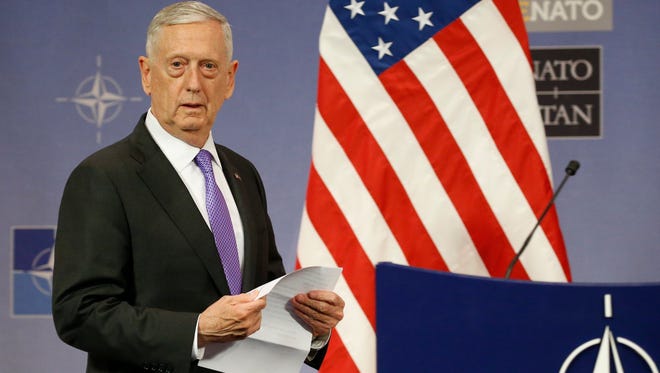Pentagon delays acceptance of transgender recruits and officers
 Tom Vanden Brook
Tom Vanden Brook
WASHINGTON — The Pentagon announced late Friday that it will delay until at least 2018 rolling out its policy for acceptance of transgender troops into the ranks.
The move by Defense Secretary Jim Mattis comes just hours before a July 1 deadline, set in the Obama administration, for the military to recruit transgender enlisted troops and to accept new officers.
"Secretary Mattis today approved a recommendation by the services to defer accessing transgender applicants into the military until Jan. 1, 2018," Pentagon spokeswoman Dana White said in a statement. "The services will review their accession plans and provide input on the impact to the readiness and lethality of our forces."
In May, Deputy Defense Secretary Robert Work had ordered the armed services to advise him of their plans to meet the deadline, or advise him of concerns about how accepting new transgender troops could affect the military's readiness to fight. The Army and Marine Corps both sought delays.
Transgender troops already in the ranks can continue to serve, under the policy developed last year by then-Defense Secretary Ash Carter. Mattis has made clear that the military's readiness to fight is his top priority.
READ MORE:
Decision to start or delay transgender troop policy rests with Defense chief Jim Mattis
Army orders soldiers to undergo training to accept transgender troops
But the lack of a policy to accept new transgender troops already has caused problems. In May, the Air Force and Army were unable to commission transgender cadets from their prestigious military academies because the military lacks an acceptance policy for new transgender troops.
Aaron Belkin, director of the Palm Center, which studies issues of sexuality in the military, said it would force troops to lie about their identity, as did the former policy that prohibited gay and lesbian troops from serving openly.
“Secretary Mattis' decision to prolong the enlistment ban will have the effect of requiring applicants to lie in order to join the military, as was the case under ‘Don’t Ask, don’t tell,’ Belkin said. “That makes no sense because, as predicted by all of the research, transgender military service has been a success. “
The Rand Corp. found in 2016, in a study commissioned by the Pentagon, that accepting transgender troops would have a negligible impact on military readiness.